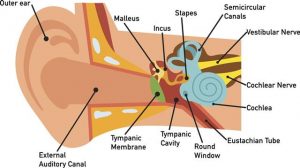Sandra Welburn is based in Newcastle and is the Head of information coordination for the northern region of the “Action on hearing loss” charity. Its former name was the Royal National Institute for Deaf People (RNID). It has been a national charity since 1911. The area covered by Sandra is from Cheshire to the Scottish boarder.
It’s the largest charity for people with hearing loss in the UK, with an understanding of how hearing loss can affect everything in your life from your relationships, to your education and your job prospects. The charity is here to support and help people to take back control and live the lives they choose.
On average it takes about 10 years for somebody suspecting they have hearing loss to take actual action. There are about 11 million people in Great Britain with hearing loss. About 4 million people have unaddressed hearing loss and 2 million people use hearing aides and about sixty thousand people use sign language.
Sandra gave an example of a man with good hearing was on a holiday flight, when he stepped off the plane, he discovered that he had lost all his hearing. It was a permanent change. She asked her audience to try to imagine what this would feel like and what aspects of hearing would be most missed. She explained how as hearing loss increases a person becomes more isolated within their family as loved ones tend to cut the person out of conversations and activities. Other people may begin to treat a person as being less intelligent. Lip reading becomes important and television viewing requires the volume to be turned up or subtitles restrict choice of programmes.
Besides hearing loss, the charity helps with Tinnitus. Tinnitus is often described as ”ringing in the ears”, but it’s the name for hearing any sound in your ears or head when there’s nothing outside your body that’s making that sound. The charity supports a Tinnitus Helpline and a Tinnitus Forum.
Action on hearing loss helps people to manage their lives by providing care homes; an engagement service; research teams; a products department; cafes and campaigns.
Large resources are provided towards research across the world and this is bearing fruit. Since 2006 in the UK new-born babies without hearing may get a cochlear implant. The implant consists of a microphone and a transmitter outside the head, which send signals to an implanted receiver under the skin. This in turn sends signals to electrodes implanted in the cochlea. When the electrodes receive a signal, tiny electric currents stimulate the auditory nerve, which carries sound from the cochlea to the brain. In 2016 a new gene was discovered that is related to the hearing mechanism and gives hope that treatments might be developed to reduce or reverse hearing loss.
Soon sign language will be taught in all primary schools in England.
The charity in your local area provides support in dealing with: benefits and grants; everyday life; your rights; communication tips; products and technology; blogs and forums.

